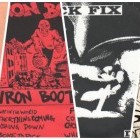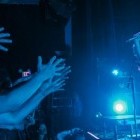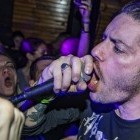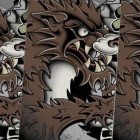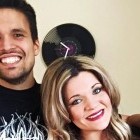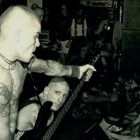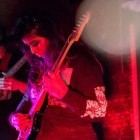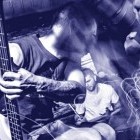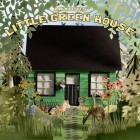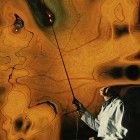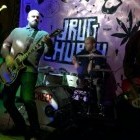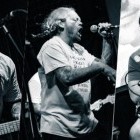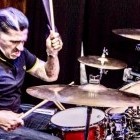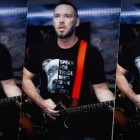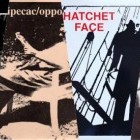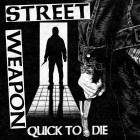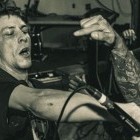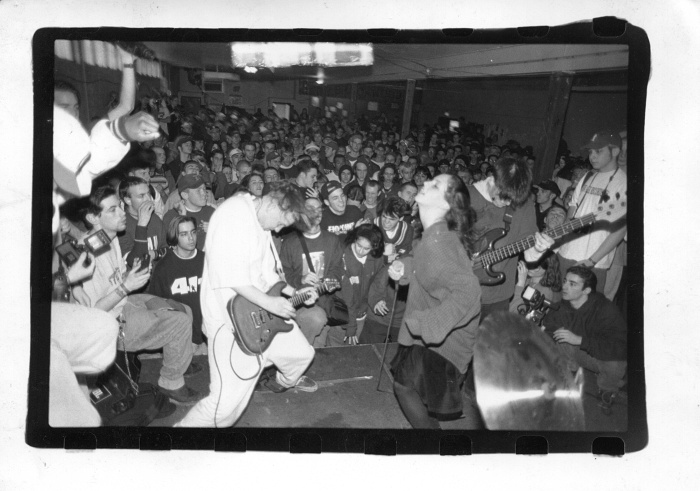
Brian McTernan began playing shows as a young teen in 1990 with the band Battery. Ever since then, he's built one of the most impressive discographies in the hardcore community.
While he went on to play in the bands Ashes and Miltown, Brian also mounted a successful career as a producer, working on records by Thrice, Snapcase, Hot Water Music, and Turnstile, among many other acts from various musical scenes and styles.
These days, Brian fronts Be Well alonsgide drummer Shane Johnson (Fairweather), bassist Aaron Dalbec (Bane, Converge, Ten Yard Fight), and the guitar team of Peter Tsouras (Fairweather) and Mike Schleibaum (Darkest Hour, Battery).
The melodic hardcore band's The Weight and the Cost landed on my personal Best 10 Hardcore Records of 2020 list a few weeks back.
I've previously interviewed his brother, Mike McTernan (Damnation A.D., When Tigers Fight), so I decided it was about time I did the same with Brian. I hope you enjoy reading this piece as much as I did putting it together.
Tell me a bit about your experience at home as a kid. When your brother, Mike, stayed at my house a few years back, he told me you guys didn't have an easy upbringing at times.
It was not the happiest household. My father has fairly severe OCD and my mom has struggled with depression her whole life. They fought a lot and things always felt pretty out of control. Mike and I handled the stress of it very differently. He withdrew and kept to himself and I was very angry and got in a lot of trouble.
On the other hand, even though my parents didn't ever listen to music, my mom was very supportive of us once we got into it. She drove us to shows in pretty bad neighborhoods, and she bought me my first guitar and 4 track.
Also, in some ways, the chaos of my house was a plus—we were allowed to go to shows from a really young age and make tons of noise. Out of town bands used to crash at our house all the time, which led to so many friendships that remain today.
What were some of the bands you got into early on? Also, did you have someone who helped introduce you to hardcore/punk?
I initially got into new wave stuff, but when I was in 5th grade my brother brought home the movie Suburbia, and it was a game changer. I started trying to find anything punk I could to listen to.
My mom would bring us to record stores and I would just ask the people working for suggestions. I started off listening to the Dead Kennedy’s, Sex Pistols, and the Exploited. I was going to a Catholic school then, and I could never get my combat boots laced up in time after gym—my teacher threw them out the window one day.
The summer before 6th grade, a older neighborhood kid kind of took us under his wing. He introduced my brother and me to 7 Seconds, Agnostic Front, and Dag Nasty, and started bringing us along to shows. That ended up being the music that changed my life.
At what point did you go from listener to participator?
I started singing in Battery when I was 13. I met Ken Olden through a girl I was dating whose brother was the drummer in Ken's band Strength in Numbers. I loved the New York style hardcore and when he started a new band in that vein, I used to watch them practice.
They were having a hard time finding a singer, so I started singing at rehearsals. They booked time to record a demo so that they could get singers to try out, and I tagged along. The plan was never to have me sing—I was only in eighth grade and they were seniors in high school—but the engineer suggested that I do a pass of what I had been singing at practice.
It ended up coming out great, and the put it out as the first Battery demo. We played our first show with Sick of It All at the Safari Club on June 9th 1990. Soon after that, I started Ashes and Ken started Worlds Collide and we didn’t focus on Battery again until the demo was re-released on Lost and Found in Europe in 1993.
Going backwards for a moment, I remember when you posted that photo of you performing with Battery as a young teen on your personal Facebook page (seen below), you mentioned being hospitalized, and going through an incredibly tough patch when that show happened in 1990.
Very soon after Battery played our first show, my life kind of went off the tracks. I was starting high school, and things just felt totally out of control. My whole life revolved around hardcore and graffiti and the only kids I felt connected to were all misfits.
I started getting in a bunch of fights and ended up getting kicked out of school. I think my parents just didn’t know how to handle me. Not long after I got expelled, they took me to a psychiatric hospital under the guise of getting me tested for school, but it soon became clear that I wasn't actually leaving.
I ended up spending a month there and it was a jarring and traumatizing period in my life. People were a lot less open about mental health then and I think my parents didn't quite know how to explain what was going on with me to the world. They didn't tell anyone where I was, so I didn't have any visitors.
I felt like I’d disappeared. Without a doubt, it was the loneliest stretch of my life. The one unintended benefit of my time in the hospital was that I taught myself to play guitar.
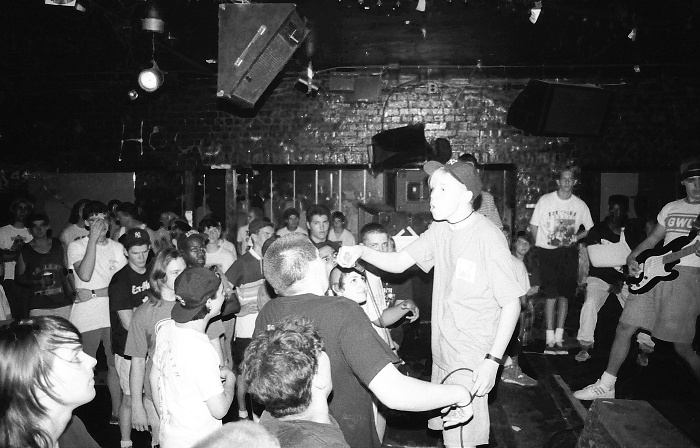
Since you brought up Ashes before, how did that project get going, and what were some of the bands that inspired you to start it?
Ashes started as a band called Rise. We played a few shows in 1991, but soon after our bass player, Noah Eig, was struck by lightning and died. We were all really close, and it was incredibly traumatic for all of us.
We decided it didn’t feel right to just replace Noah. Instead, we reformed as Ashes and Jack Radner, who had played guitar in Rise, moved to bass.
My vision for Ashes was to do something that felt like Verbal Assault meets 10,000 Maniacs.
I love that!
We started playing shows at a lot of the local private schools and developed a pretty incredible fan base. Despite that, we couldn’t get added to a local hardcore show to save our lives. The discography that we put out was called Wisconsin Avenue Tour as a funny reference to the fact that for the first year we were a band, we really only played at all of the schools up and down Wisconsin Avenue.
Then my brother, who has always been my biggest supporter, ended up taking our demo with him to sell on the Worlds Collide tour. We started getting letters from people all over the country and some of them started offering us shows out of town. We were only 15 at the time, so we often had to have friends and parents drive us.
Mike also sent the demo to Mike Hartsfield and Dennis Remsing, and they signed us to Network Sound. In 1993 we toured the West Coast and it was rad. We flew out there and Mike and Dennis drove us to the shows. I remember feeling so welcomed by all of the bands out there.
Jeff Caudill from Gameface designed our first shirt, Jon Bunch from Sense Field taught Elena [Ritchie] how to warm up, and we played got to play with Farside, Outspoken, Mean Season, Unbroken, and countless others.
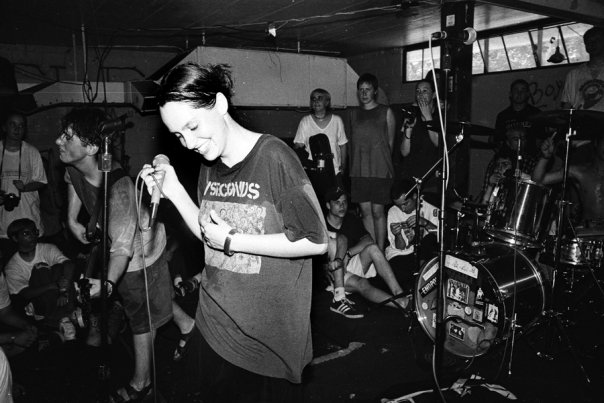
You guys definitely ended up doing some cool stuff in a short span of time.
It blows my mind how many of the people we met on that trip are still a part of my life. We did a US tour the following summer in 1994 with Dayspring, and then that fall everyone except me went to college. We all thought we would be able to keep the band going, but it didn’t work. We went on to play a few more shows, but that was the end of the band.
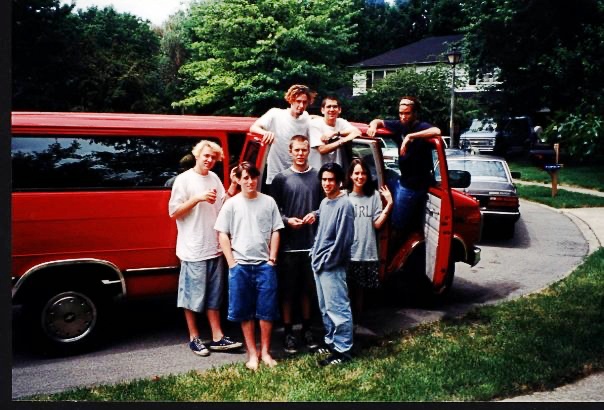
I would be remiss without asking you for your thoughts on your time in the short-lived band Miltown, which featured the one and only Jonah Jenkins (Only Living Witness Raw Radar War) on vocals.
Miltown was a wild ride. We formed in 1996, right after I got home from the European Battery tour in support of Until the End. Ashes had just broken up and Matt Squire and I were trying to find new people in Boston to play with.
I met Jonah Jenkins when he came to do gang vocals on a Cast Iron Hike 7 inch that I was recording. I had always loved Only Living Witness, so I was stoked when he wanted to jam. We had only played a few shows before we started getting interest from major labels.
Miltown ended up signing to Revolution Records, which was a subsidiary of Warner Brothers. Unfortunately, things started unraveling almost immediately. We went into the studio with a producer who did not understand where we were coming from at all, and who ended up bailing on us to produce Korn.
The plan was to start fresh with a new producer that understood the band better, but that never happened. It was a very stressful time and internal differences just drove us apart and caused the band to break up. I think we were only together for a little bit over a year.
Everyone in the band was really talented, and Jonah is an amazing singer- he’s deep and compelling with an otherworldly voice. It kind of breaks my heart that the record was never finished.
Let's get into the producing/engineering side of your music career. Did you have someone who taught you how to engineer, or did you learn by trial and error?
Early on, I was inspired by producers like Don Fury, Brett Gurewitz, and Don Zientara, whose name consistently showed up on on all of my favorite records. Steve Evetts and Mark Trombino also raised the bar sonically and were both early inspirations for me.
Interestingly, though, it wasn’t until the very end of Ashes that I actually got involved with recording. Matt Squire, who played drums in Ashes, had an 8-track in his basement and he would record all of our stuff. I think because Matt already knew something about it, we all just defaulted to him interfacing with the engineer in the studio.
It never even occurred to me that I’d have anything to add or even that I’d be interested in that part of the process. When Ashes went to Atlanta to record our last two songs, Matt’s brother lived down there, so he left to hang out with him after the basic tracks were done.
For the first time ever, I was left with the engineer, and I sat behind the board. I was instantly hooked. We were making the record at our friend Issa Diao’s studio. Issa was someone I knew, he was pretty young at the time, not much older than me. He had just bootstrapped his way into opening a studio.
So the other thing that came from that session was suddenly seeing a pathway to how someone like me could actually get into recording. When I got home from that trip I was singularly focused on learning to record and produce. It really marked the start of my identity as producer.
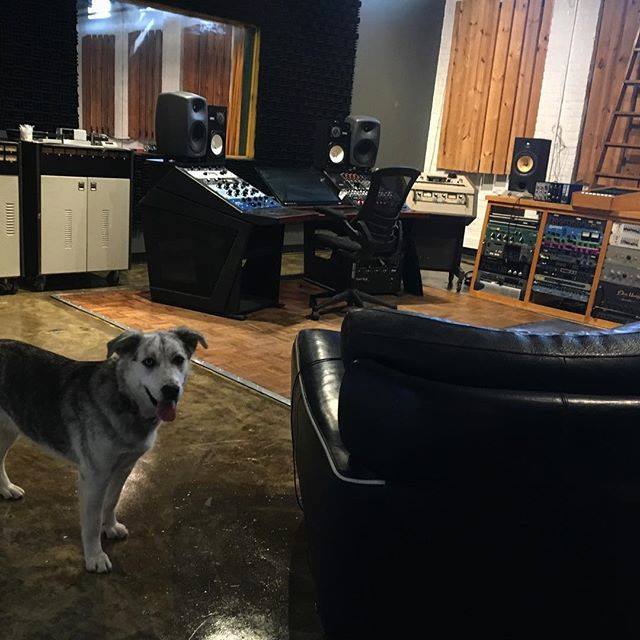
When you listen back to the early stuff you were behind the boards on, do you cringe, or are you generally happy with the results? On the other side of that, what is the record you feel there was a turning point where you felt like you finally nailed it?
No, I actually can’t believe how cool the early records sound. I didn’t have nice gear, I was recording in a cellar, and I had almost no experience. Somehow we were making records that people still love today. There is a charm and character that makes up for the records not being super pro sounding.
I look back at Bane's Give Blood album as a real milemarker in my career. Bane was a band that I was involved with from the beginning, having recorded their demo and first 7 inches.
By the time we got back together to make Give Blood, I had really come in to my own as a producer, and they had evolved as band on a similar track. It’s nice to be able to look back and see the trajectory of it all.
When the producing began to take off, did you make a conscious decision to concentrate on that and put the band stuff on the back burner? I imagine it became your full-time gig pretty early on.
Starting in 1994, even though I was still playing in bands, the studio became my full-time job. In 1998, Miltown and Battery both broke up within a two month time period, and it felt like it was time to focus solely on producing.
Being in a band had felt unstable, not just from a monetary perspective, but also in the sense of how dependent you are on others. One member can potentially wipe out years of work and you have no control over it.
Focusing on the studio side of things was the right decision. I was really starting to come into my own as a producer, and the world that I was entrenched in was about to get way bigger than anyone could have imagined.
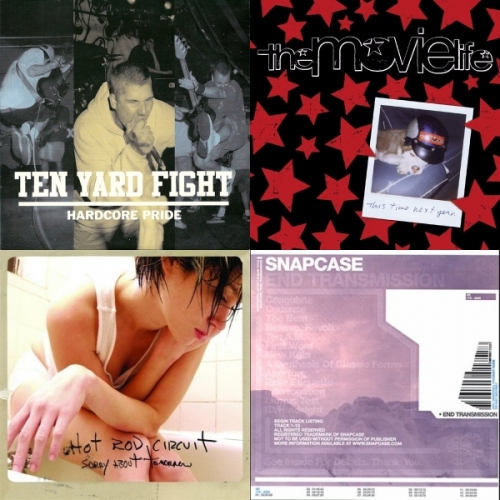
Talk to me a little about that. When did you start feeling like you were going from working on these records that were aimed at the underground/punk/hardcore worlds to something bigger? I'm assuming people from the major label world and management companies came out of the woodwork.
I don’t know that I ever thought about it like that. I had been involved with most of the bands from such an early point in their careers that I think the success they were having snuck up on all of us.
I really wasn’t thinking about any larger dynamics like how the scene was evolving beyond punk and hardcore—I just wanted the records to be amazing and do well. I never stopped doing hardcore records even as I was working with some of the other bands that were somewhat outside of that world, so that also kept me grounded.
If memory serves me correctly, Thrice’s The Illusion of Safety was sandwiched in between Strike Anywhere’s Change Is a Sound and Bane’s Give Blood. It was a very exciting time and there was an incredible energy and momentum behind it all.
A point did come where a lot of major labels starting sniffing around all of it, but I really don’t recall feeling like all that attention changed the record making process in any way.
I'm sure many people reading this would love to nerd out about some of the records you produced throughout the years. What memories stick out for the sessions behind Reach the Sky's So Far From Home Record? What was your relationship like with those guys, and did you prefer one record over the others?
I loved all of those guys. I recorded Ian for the first time when he was singing for Reason Enough. He was hanging with a lot of pretty tough dudes in Boston, but he was always a sweetheart and a lot of fun to be around.
I don’t know that I have a favorite record per se, but the breakdown in "Maybe Next Year" still makes me super stoked.
An album you produced that I always enjoyed and got a bit overlooked was Thriller by New End Original. What do you remember about that record? You clearly had a history with Norman Brannon and Scott Winegard from the Texas is the Reason days.
Thriller was a really cool record to work on. I had worked with Norm [Arenas] and Scott [Winegard] before in Texas Is the Reason, and I knew Charlie [Walker] from even further back, when Ashes played with Split Lip and Chamberlain.
The only person I didn’t know going in was Jonah [Matranga], but I was always a huge fan of Far. I actually have a memory of feeling a little bit intimidated by Jonah, not because of anything he said or did, but because he had worked with so many well-known producers and I was only 23 at the time.
Everybody in the band was super rad and it was awesome to be able to be involved.
Let's move on to Be Well. When did the idea for the band first come up, and who spearheaded everything? Also, what were some of the stylistic influences you guys wanted to explore with the band?
Initially, Be Well started out as a vehicle for me to reconnect with writing music again. As soon as I started writing, I realized how much I’d needed an outlet to express all the things that were going on with me that I’d been struggling to to express otherwise.
At first, it was just me sending rough ideas back and forth with Mike, but once Aaron, Peter, and Shane were added to the mix, it really started to feel like a band. There wasn’t a specific sound we were looking for, but more of a feeling that We hoped the music would elicit.
The over arching goal was to create something was high energy, emotional, and honest. Something that was equal parts nostalgic and new.
How connected did you stay with what was happening in the hardcore scene throughout the years? I'm sure Be Well has reinvigorated your love for the music/community.
I always stayed active in the hardcore scene. Almost everybody I know is either a band member, producer, photographer, artist, or a contributor to the scene in some manner. My whole universe has been music for as long as I can remember.
More than anything, Be Well has been a reminder for me of why this community is so important. When I was a kid, hardcore helped me identify who I was; it shaped my moral compass and gave me a community of friends who understood me.
Here I am 30 years later, and I’m still turning to hardcore for those same things. Making the Be Well record helped me express a lot of things that I was really struggling to express otherwise.
Just knowing that there is a community of people where I feel seen and accepted makes me feel a whole lot less alone, and it’s helped me share more of myself than I ever imagined that I could.
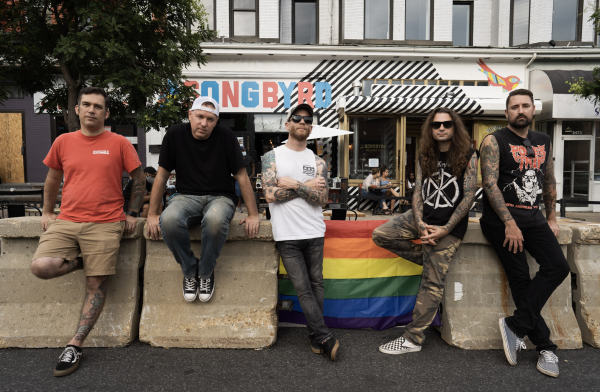
You have been very open about your struggles with depression, and on the Be Well album, that's something you didn't shy away from writing about. I feel a large percentage of people from our generation are still embarrassed to admit and talk about depression/anxiety issues. How tough was that for you?
I think you’re definitely right. Even though mental health issues have certainly become less stigmatized, it’s still not something that feels safe to be open about. I understand why people aren’t comfortable talking about their own mental health.
I have spent a lifetime feeling an immense amount of shame about things I’ve felt and thought. I feel like I should be happy, more positive, I know that I am loved and respected, I know that I am a good friend, father, and husband, but I have a very hard time incorporating that into how I see myself.
I have felt both undeserving of the success in my life, and also guilty because I second guess my right to feel depressed. I know that I am lucky to have lived the life that I have lived, and I’m aware how much harder other people's situations are, but then that doesn't change the fact that I have felt pretty terrible for as long as I can remember. It makes it complicated to talk about.
Writing this record and putting it out in the world was really hard. I had so many things inside of me that I didn’t know how to get out any other way, and that was what led me to start writing again. I think that if I am being completely honest, one of the only reasons I was able to be so open with the lyrics is that I didn't really anticipate people ever hearing it.
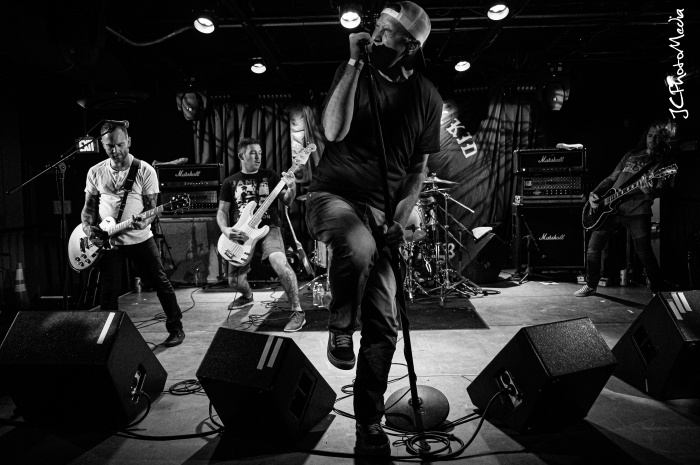
Is the song "Morning Light" on the Be Well album directly related to your struggles?
"Morning Light" was one of the first songs that was written for the record. One of the ways that I dealt with my depression and anxiety was to do anything I could to not feel anything at all. There is a sense of desperation in the words that I am able to see now, and that I didn’t fully process when I was writing them.
It’s interesting for me to look at the arc of the record and see how much more clarity I had about my own feelings by the end of the process. The way that people have responded to the record has been amazing, and it’s not lost on me that the thoughts that have made me feel so isolated throughout my life are now connecting me with so many people in such a meaningful way.
Finally, now that the Be Well album has been out for a little while, I imagine you've had some interesting feedback about the lyrics. What do you attribute about the way your lyrics are written/delivered that resonates with people in a very personal way?
Going into this record, I had a lifetime’s worth of things that I probably should have said a long time ago but hadn’t. I tried to express those things as honestly and clearly as I knew how.
There is a part of me that finds great comfort in knowing how many people are able to relate to the lyrics, but it also makes me sad to realize how many other people have felt how I have felt for so long. The Weight and the Cost is the furthest thing from a self help record, but I do hope that people that hear it know that they are not alone.
***
Be Well's The Weight and the Cost is available now via Equal Vision Records.
***
No Echo has launched a Patreon with 3 tiers offering all kinds of hardcore-related goodies to help support the site:
***

